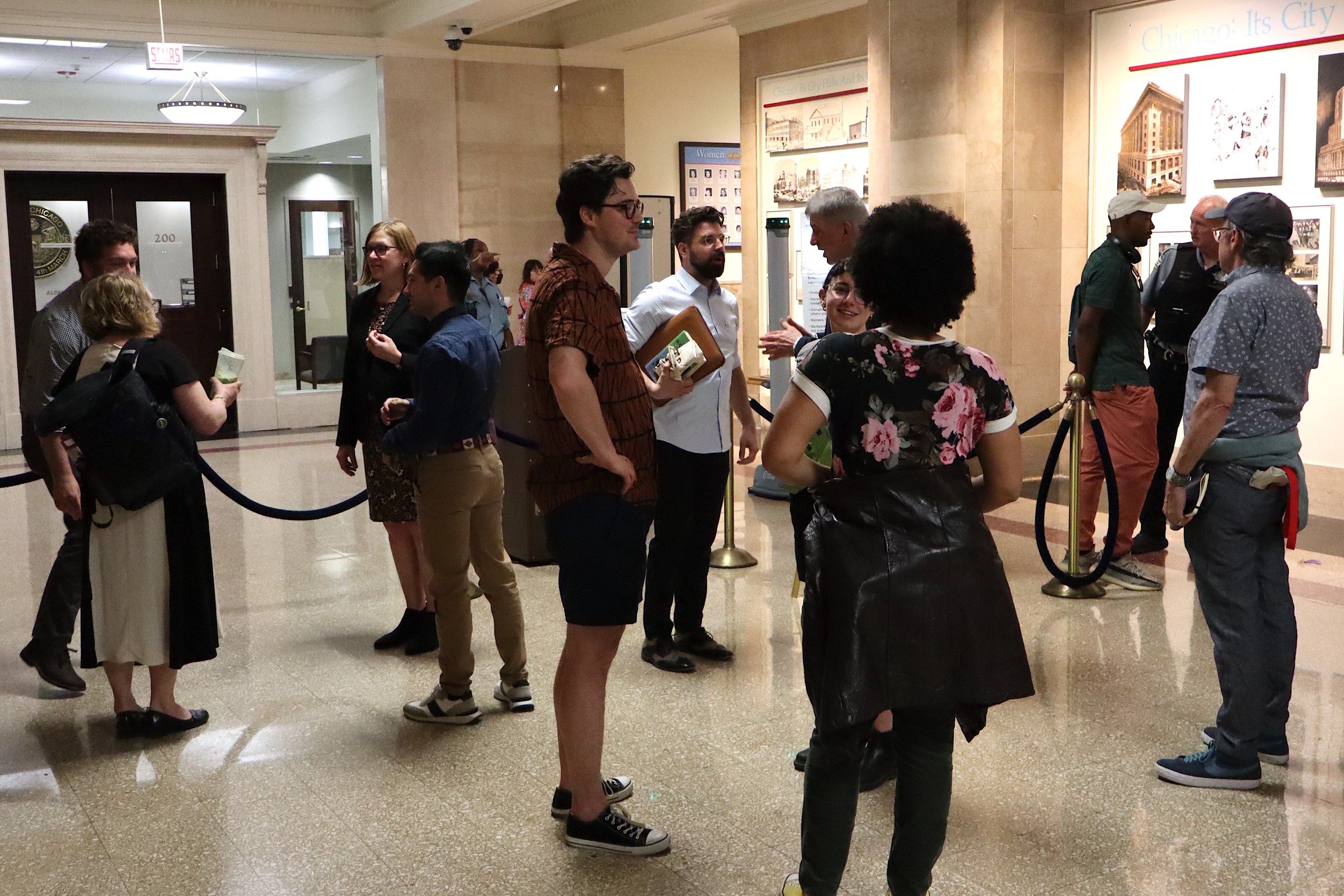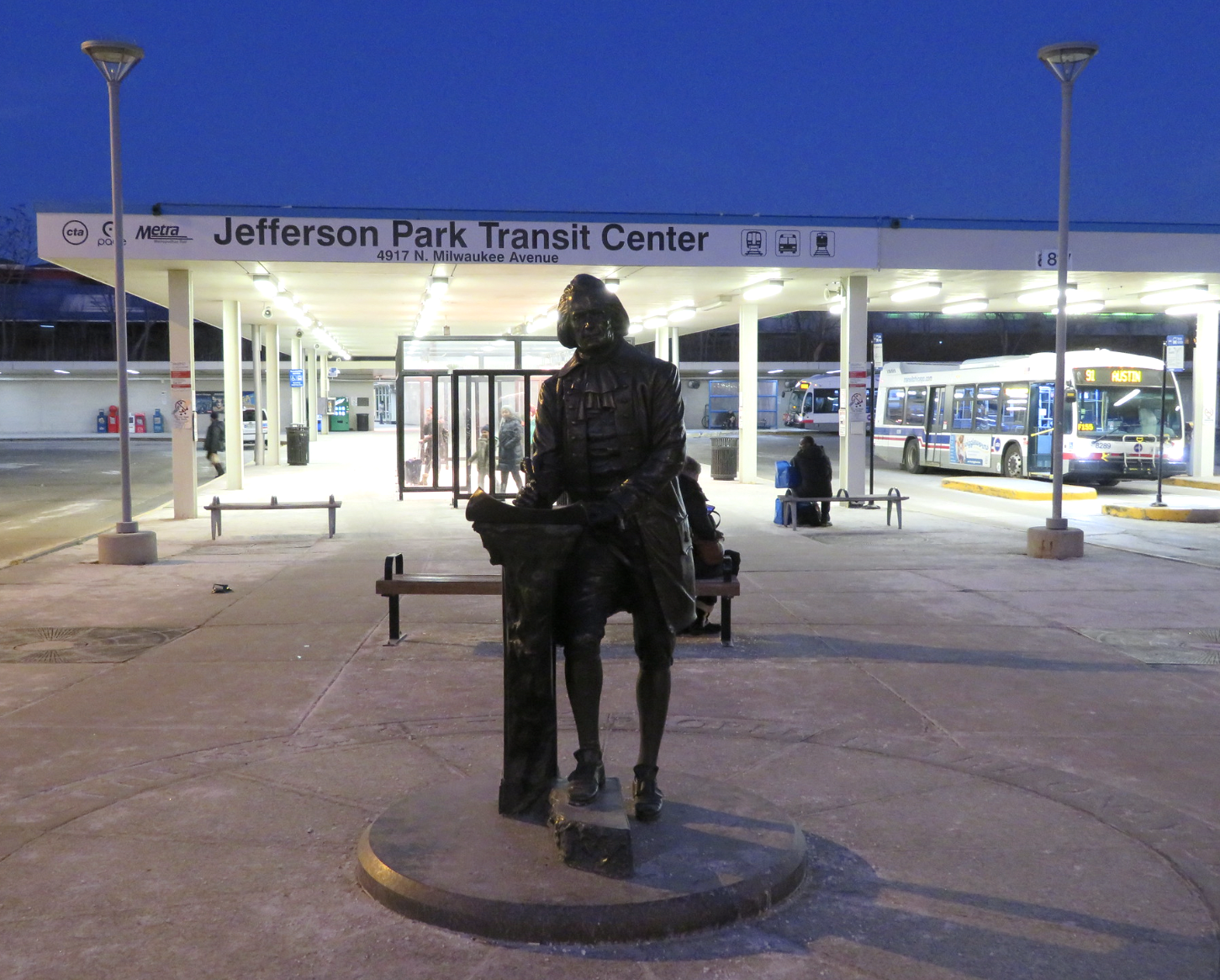Metra is recruiting workers in anticipation of post-Omicron schedule expansion
4:50 PM CST on February 2, 2022
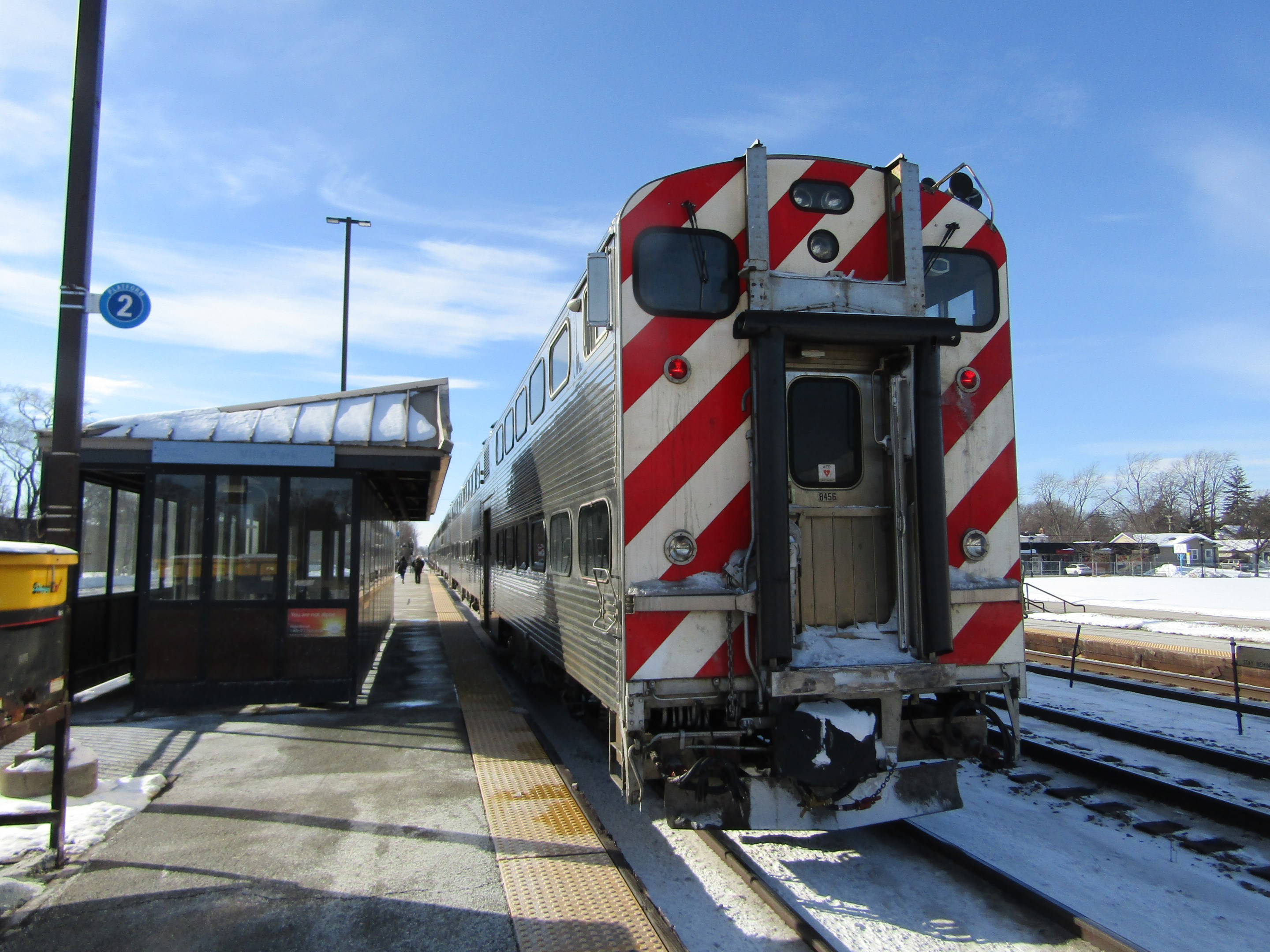
An outbound Union Pacific West Line train at the Villa Park station. Photo: Igor Studenkov
The Omicron surge derailed the potential Metra schedule expansion, but it hasn’t stopped the commuter railroad from actively hiring positions for when the service does ramp up.
On December 29, Metra announced a “major hiring effort” to make sure it has enough train crews to accommodate “schedule adjustments in the first quarter of 2022.” During the railroad's January 19 board meeting, executive director Jim Derwinski reported that, while Metra originally planned to roll out the service increases that month, Omicron caused them to push back those plans until March at the earliest. He said each line will be evaluated on case-by-case basis, with the railroad looking at ridership patterns and how many businesses bring their employees to the office.
The hiring affects the four “district” lines Metra owns (Metra Electric District, Milwaukee District North, Milwaukee District West, and Rock Island District) and the three “Service/Corridor” lines where Metra operates service on tracks owned by freight railroads under rights-of-way sharing agreements (North Central Service, Southwest Service, and Heritage Corridor.) BNSF Railway operates the BNSF Line under contract with Metra, and BNSF is responsible for hiring whatever crews it would need to meet the service requirements.
Things are more complicated with the Union Pacific Railroad, which inherited a similar arrangement from the Chicago & North Western Railroad for what are now known as the Union Pacific North, Union Pacific Northwest and Union Pacific West lines. UP spent the past few years trying to get out of the contract and shift to an arrangement similar to the agreements Metra already has with the “Service” lines. The negotiations are ongoing, as it’s not clear how long Union Pacific will continue running the service and whether Metra would need to hire new crew to replace UP crews
One thing that's certain is that, while BNSF and Union Pacific are both hiring a handful of passenger train crew positions, it’s nowhere near as much of a ramp-up as what Metra is doing.
One interesting wrinkle is that Metra is requiring job applicants to be vaccinated. Union Pacific and BNSF currently have no such requirements, with both citing ongoing federal lawsuits against mandates imposed on them as federal contractors. They will hold off on requiring fascination unless the federal case is resolved in the Biden administration’s favor.
The long, slow service restoration
When Illinois' Stay at Home order took effect in March 2020 and demand plunged, Metra significantly reduced its schedules. Since June 2020, the railroad has been gradually rebuilding the schedules, even as COVID surges set some of those plans back. And Metra made it clear that, even after the pandemic is over, the schedules wouldn’t look the way they did in 2019. Throughout 2021, Metra launched several schedule pilots to increase off-peak service and did some short-term experiments.
While the schedules for some of the busier lines, such as BNSF, the three Union Pacific lines, MED, and RID are close to pre-pandemic service levels in many respects, there's still plenty of room for improvement. The North Central Service schedule is still at half of pre-pandemic levels (five trains a day in each direction versus ten before the pandemic), which eliminated most evening service and severely reduced reverse-commuting options.
Similarly, Metra hasn't yet restored most of the Milwaukee District North reverse commuting options that were introduced in 2019, and half of the late-evening runs haven’t been brought back. Neither was inbound evening train #120, which made all the North Central line stops as far as Grayslake before switching to the Milwaukee District North line, making stops at Lake Forest and Deerfield before going express the rest of the way.
The SouthWest Service line doesn't have its Saturday service back and, at five trips in each direction, it’s at a third of pre-pandemic service frequency. The cuts mostly affected evening and off-peak service, with the two stations that already had less service than the rest of the line during the pandemic – the Manhattan station and New Lenox’s Laraway Road stop – losing non-rush-hour service altogether. The Heritage Corridor, which was already weekday rush hour-only service even before the pandemic, is still operating three trips each way instead of four.
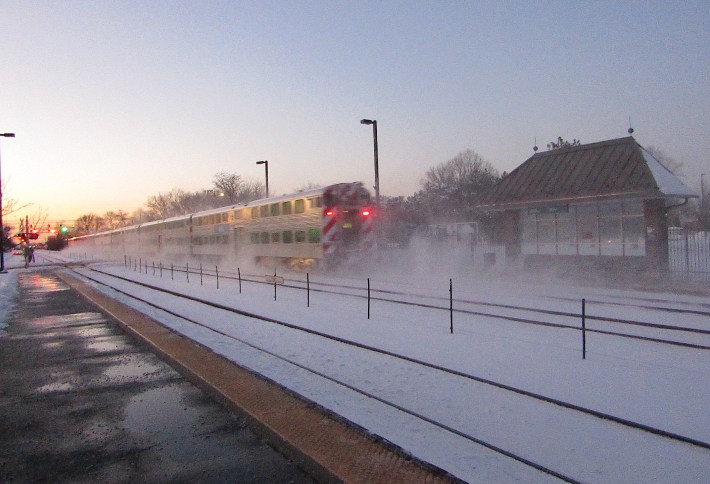
Metra Hiring Spree
The Metra press release on the recruitment push says the railroad will be hiring “locomotive engineers, conductors, coach cleaners, [track workers], maintenance positions, and other positions in operations and administration.” It indicates that many of the new hires are for positions that have been left vacant throughout the pandemic, adding that “there may also be openings created by employees opting to retire rather than comply with Metra’s COVID-19 vaccine mandate.”
Metra spokesperson Michael Gillis said the commuter railroad had no way of knowing how many employees would fall in the later category. “We have people retiring every month routinely. They don’t have to give us a reason, so we can’t answer that.”
Gilis said that as of January 27 Metra was still in the early stages of the hiring process, so it was too early to talk about how many employees have been hired. He encouraged any interested job-seekers to visit Metra’s careers page for the most recent information about the open positions.
The careers page puts the vaccination requirement front and center. In contrast, the Union Pacific and BNSF career pages don’t conspicuously mention the requirement. However, the individual job postings contain language stating that, while the railroads follow the vaccine mandates, due to the federal lawsuit against the mandate, they are pausing enforcement until the case is resolved.
Since both railroads ship products to U.S. armed forces, they fall under the mandate that required federal contractors to have all of their employees vaccinated by January 18, 2022. On December 7, a Georgia federal judge issued a preliminary injunction against that mandate until the 11th Circuit U.S. Court of Appeals rules on the case. While that doesn’t necessarily prevent railroads from mandating vaccinations on their own, the two railroads decided not to require it for the time being.
”It is still possible that the mandate, as it applies to BNSF, could be upheld in court in the near future," the BNSF statement read. "If this happens, BNSF employees would be required to be vaccinated."
Union Pacific took a similar position, stating that employees are encouraged, but not required to get vaccinated. As of December 8, 73 percent of their employees have gotten vaccinated. That's rather ironic, because UP refused to have conductors on the Metra lines it operates check tickets between March 2020 and June 2021, claiming that approach was a pandemic safety precaution, despite Metra's protests that the policy was costing it a million dollars a month in fares. However, a railroad industry insider told Streetsblog that UP's recalcitrance was actually a strategy to “bleed Metra dry” in order to pressure it to pay to take over commuter rail operations for the three UP lines.
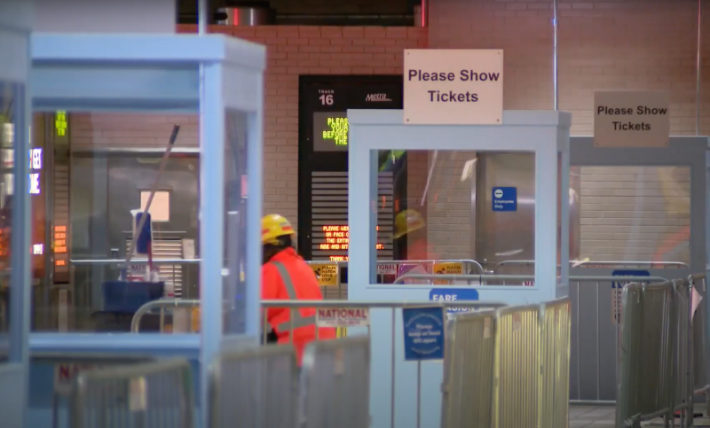
Meanwhile, Metra continues to grapple with the fallout from the Omicron surge. Derwinski told the board that ridership has recently taken a severe drop. "Over the last four to five weeks we're closer to 15 percent of the pre-COVID numbers,” he said, adding that Metra attributed that dismal number to both the surge and the regular decline in travel that happens during the holiday season.
And the effects of the surge went beyond passenger declines. While Derwinski didn’t give any specific numbers, he said that it led to more employees then usual having to take time off work. “I can't describe how proud I am of the continued work our employees put together,” he said. “They answer the call, they work together to support each other and the riders in this region, even as they're shorthanded.”
With the number of cases dropping again, at least for the time being, Derwinski said the commuter railroad is cautiously optimistic about the future. "Currently, we're targeting an enhanced scheduling, [with] schedule updates on various lines in March. Those line adjustments will be driven by ridership counts, ridership feedback and the ongoing conversation with the business community.”
Stay in touch
Sign up for our free newsletter
More from Streetsblog Chicago
They can drive 25: At committee meeting residents, panelist support lowering Chicago’s default speed limit
While there's no ordinance yet, the next steps are to draft one, take a committee vote and, if it passes, put it before the full City Council.
One agency to rule them all: Advocates are cautiously optimistic about proposed bill to combine the 4 Chicago area transit bureaus
The Active Transportation Alliance, Commuters Take Action, and Equiticity weigh in on the proposed legislation.

